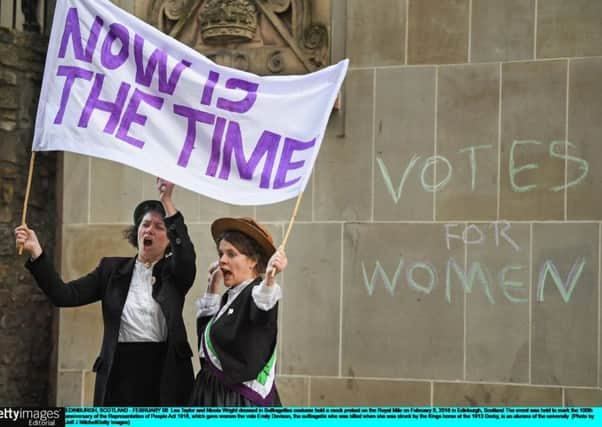Leader comment: Suffragettes were freedom fighters


A century on from the recognition that women should have the right to vote in the UK, the battle for equality of the sexes rages on.
When the New York Times ran an article about allegations of sexual harassment against Hollywood industry mogul Harvey Weinstein just a few months ago, the resulting #MeToo campaign was an eye-opening experience for many. Women from all walks of life came forward to describe rape, sexual assault, abuse of power, and routine experiences of inappropriate behaviour by men. The resilience of the gender pay gap – decades after equal pay legislation – is another sign of how entrenched sexist attitudes are.
Advertisement
Hide AdAdvertisement
Hide AdIt is tempting to view progress towards a better world as an inexorable force; one of Barack Obama’s favourite quotes – from Martin Luther King – is: “The arc of the moral universe is long, but it bends toward justice.” In truth, it often regresses.
If progress is to be maintained, good people need to take a stand. The Suffragettes were undoubtedly on the right side of history, so calls for them to be pardoned for crimes committed in freedom’s name carry significant moral force.
The slogan of the Women’s Tax Resistance League was “no vote, no tax”, echoing the cry of the American Revolution, “no taxation without representation”. Suffragettes were freedom fighters just as much as America’s founding fathers.
Retrospective pardons are less about restoring justice and more about sending a message to people in the present day.
So Suffragettes found guilty of non-violent offences should be pardoned to signal their cause was just and that some charges were unjustified or politically motivated. But those guilty of violence – like planting a bomb which blew up the then Chancellor Lloyd George’s house – should not.
A central message of the Suffragettes – a very democratic one – was that laws passed without their consent did not apply to them. They broke the law to make that point. Their violence is a powerful lesson of what happens when democracy is denied.
Pardoning violence is also a dangerous thing to do in a democracy. It would be mis-used by those who subscribe to undemocratic causes to justify acts of terrorism.
Suffragettes fought for democracy and freedom, we should not allow their memory to be twisted.
